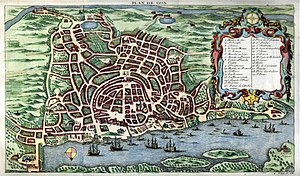Portuguese Conquest of Goa (1510)
| Capture of Goa | |||||||
|---|---|---|---|---|---|---|---|
| Part of Ottoman–Portuguese conflicts | |||||||
 Map of Goa, in Histoire générale des Voyages, de la Harpe, 1750. |
|||||||
|
|||||||
| Belligerents | |||||||
|
Vijayanagara Empire |
Bijapur Sultanate | ||||||
| Commanders and leaders | |||||||
|
Afonso de Albuquerque Thimayya |
Yusuf Adil Shah Ismail Adil Shah |
||||||
| Strength | |||||||
| 1500 Portuguese 300 Malabarese 34 ships |
Unknown | ||||||
| Casualties and losses | |||||||
| Unknown | Unknown Civilian casualties unknown |
||||||
The Portuguese conquest of Goa occurred in 1510 on behalf of the Portuguese admiral D. Afonso de Albuquerque. Goa (also Old Goa or Velha Goa) was not among the cities Albuquerque had received orders to conquer: he had only been ordered by the Portuguese king to capture Hormuz, Aden and Malacca.
Albuquerque attacked Goa at the invitation of a local chieftain Thimayya, an exiled Hindu from Goa who was admiral of the Honavar fleet who had received appeals from the Hindu population of Goa to relieve them from Muslim rule. Goa was a great and prosperous trading port on the Indian coast.
Albuquerque first reached the city of Goa with his admiral António de Noronha in February 1510. Albuquerque triumphantly entered the city on 17 February 1510, with little conflict.
A Muslim force then approached to reconquer Goa. Besieged, the Portuguese finally abandoned Goa on 30 May 1510 to its former ruler Ismail Adil Shah, the Muslim king of Bijapur.
Albuquerque sailed from Cannanore (capital of Kolathunad) and returned three months later, on November 24, with a stronger fleet, composed of 34 ships, 1500 Portuguese and 300 Malabarese. He again joined forces with Thimayya in Honavar. He was fearing an alliance of Goa with Gujarat, Zamorin's Calicut and the Mamluk Egyptians.
Albuquerque was then able to capture Goa in less than a day, from Ismail Adil Shah and his Ottoman allies, who surrendered on 10 December. "As soon as the Portuguese were in entire possession of Goa, Albuquerque directed that the Muhammadan population, men, women and children, should be put to the sword. This cruel butchery is far more to Albuquerque's discredit than the hanging of Ruy Dias, for which the poet Camoens so strongly condemns him."
Thereafter, Goa then supplanted Calicut in prosperity.
Albuquerque had captured Goa without royal orders, and was opposed by his captains in doing so. The king challenged the Portuguese establishment at Goa, but the council of the fidalgos finally confirmed the possession, to the displeasure of the king. The city of Goa nevertheless constituted a strong position that reinforced the strategic presence of the Portuguese in India.
...
Wikipedia
